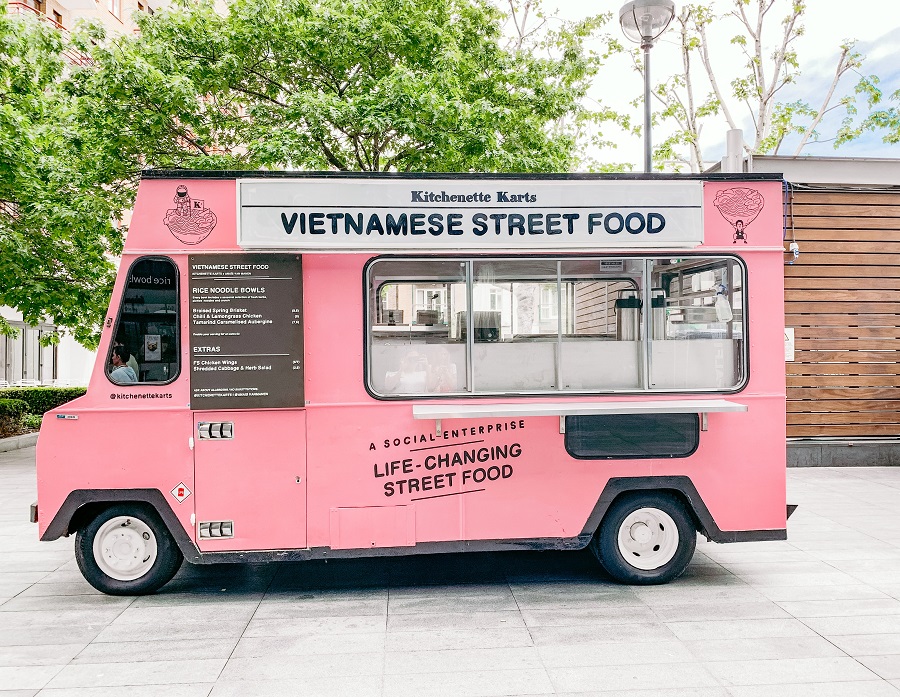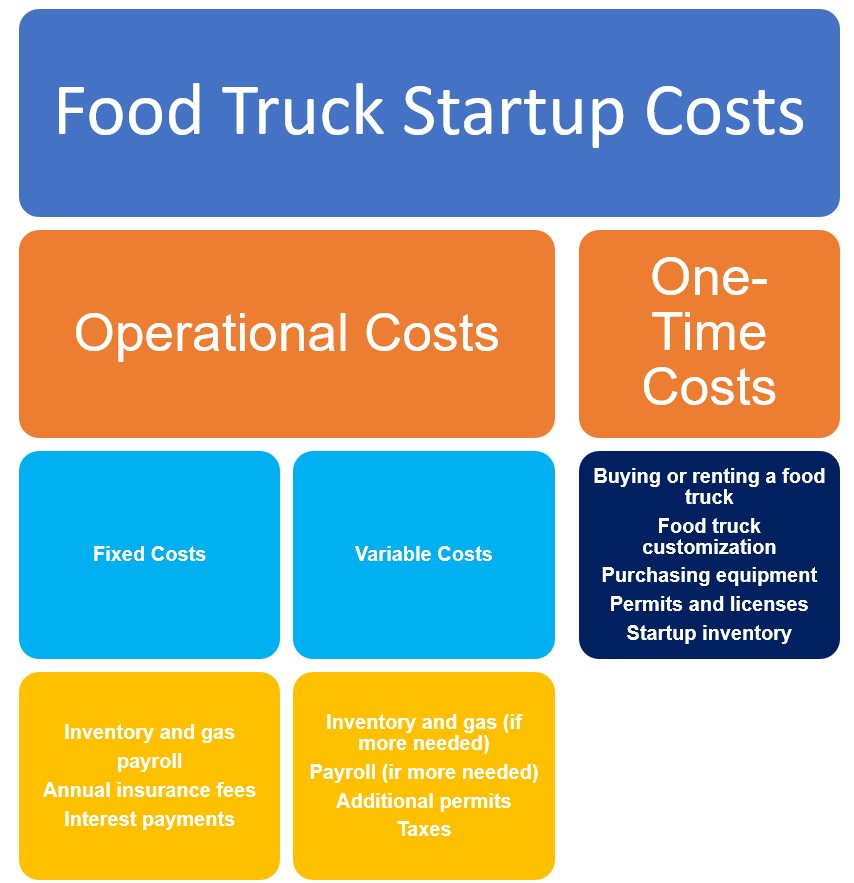How to Pay for Your Food Truck Business
How to Pay for Your Food Truck Business
Starting a food truck business is an exciting prospect for passionate people wanting to share their culinary creations with the world (or at least their city).
Indeed, the food truck industry in many parts of the United States and Europe is skyrocketing by customer demand for unique gastro findings. Moreover, the innovation by many food truck owners is giving brick-and-mortar businesses a run for the money. From food trucks to pop-up coffee businesses, mobile food is seeing rapid growth.
The emergence of third-party apps such as Uber Eats, Grub Hub, and Door Dash boosts the possibility of greater sales too.
As a future food truck owner, you know the potential for profits is there. The question is, how will you pay for your food truck?
Paying for your dream can be intimidating, but things begin to open up when you embrace the costs and identify the pools of available funding.
In this article, we will discuss the available options – specifically potential food funding sources – to pay for your food truck.
Further Reading: How to Start a Food Truck Business
Paying for Your Food Truck Business
Determine Your Concept
To pay for the food truck business, you will want to have a well-developed concept. Your concept will be complete with the type of truck you want, your menu options, and what niche you plan to serve with your food truck.
Many food trucks specialize in a particular dish or menu: you’ve probably seen food trucks that sell only hot dogs, or pizzas, or burgers, or ice cream. It’s a typical way to go. And it makes perfect sense because the more menu items you offer, the more inventory you’ll need. And more inventory requires more space, more lifting capacity, more equipment, and – as a result – more expenses with very questionable potential profits. So if you are planning to open a food truck business, focus on one concept and stick to it.
Your food truck concept will impact the price, so take time researching which direction you want to go in, what foods with high margins you will have – and who you plan on serving to. Then, start looking at possible locations to serve potential customers and what competition – if any – exists.
For example, you may wish to open an upscale food truck business near a group of high-end bars. On the other hand, perhaps you are interested in serving early morning breakfast to construction workers or mid-day lunches in downtown office towers. You may also decide to sell coffee out of your truck to early morning workers.
Consider the following questions:
- What is the level of competition for those particular locations?
- If there are two more food trucks, will your food offerings be able to compete?

Develop a Realistic Food Truck Budget
You will want to write a food truck business plan. First, you will develop a realistic budget within your business plan that lists the various costs for items necessary to get up and run. This budget will contain a list of all the anticipated expenses and costs that you will incur before and after you serve your first customer.
Your food truck budget will be an essential part of your business plan. It will be a vital guardrail that will keep you from spending too much money. It will also help you anticipate how much money you will need to obtain – which we will discuss in a second.
Developing a budget takes some brainpower, but something significant takes time and investment into thinking about the expenses. Therefore, it’s essential to create a realistic budget. That’s why your initial research and calculations are critical.
You begin to take ownership of your spending. Once this happens, you begin to feel empowered that your decisions positively impact your business. You begin to grow confident in how much money you need and why. This knowledge will be critical as you determine where you get the money from.

Understand The Different Costs Associated With Your Food Truck
If you search online, “How much does a food truck cost” – you will get a variety of ballpark figures thrown out there.
Food trucks vary in costs significantly. Many factors such as how big the truck is, what type of equipment it already has, and how old the truck is may factor into the costs. Therefore, you will see a lot of different cost numbers.
Keep in mind that many of these general figures don’t break down the costs. It’s essential to determine these minor differences so that you know where these funds need to go.
Food Truck Startup Costs – These costs are primarily associated with your startup budget. They include your legal and administrative expenses, your one-time equipment purchases, and may consist of purchasing the food truck itself.
First of all, you’ll incur one-time startups costs that have to be calculated into your food truck startup budget:
- buying or renting a food truck
- food truck customization
- purchasing equipment
- contractor or legal fees
- signing up for a POS system
- permits and licenses
- creating a website
- startup inventory
Operational Costs – These are costs that you incur to keep the engine running and food cooking. These costs will cover any monthly expenses, inventory items, such as ingredients. Typical ongoing or operational costs for food trucks are:
- inventory and gas
- payroll
- additional permits
- annual insurance fees
- interest payments,
- taxes etc.
Interestingly, your startup costs can also be broken down into your operational costs too.
For example, if you put $10,000 down on a truck and finance another $30,000, the $10,000 may be included in the startup costs, while the $30,000 may be included in the operational costs.
You will likely pay a fixed cost that consists of the principal and interest to pay for the remaining $30,000.
Operational Cost Breakdown
Operational costs can be further broken down into:
Fixed costs – these might be your general liability insurance, commercial auto insurance, and health care premiums.
Variable costs – these will vary due to the natural fluctuation in demand. For example, if you sell more burgers, you may need to pay for propane, oil, ground beef, buns, and plates. Likewise, if you work long hours or are busy, you may have to pay for more employees.
When your food truck revenue reaches the point where it can pay for your current operational cost, you will have reached your food truck break-even point.
Your Food Truck Funding Mix
So now that you have developed a solid concept and budget, you know how much money you need to start your food truck business. The next thing to do is determine where you will get the money.
It’s common for food truck business owners to get their startup seed money from various pools of funds. I like to refer to this is as a funding mix. Your food truck funding mix will vary from person to person, but the pools are pretty consistent.
We’ll list them below:
Your Savings
The first financing pool to fund your food truck will probably come from your personal savings or your earnings from your current job.
Borrow (from friends and family)
Borrowing from friends and family is another very common funding source. Even though you may be borrowing from your friends or family, I recommend that you have a written contract detailing the nature of the loan and repayment details.
Business Loans
Bank or institutional business loans are standard for many entrepreneurs, including food truck operators. You will need to provide a food truck business plan to those institutions you plan to borrow from.
Credit Cards
Using your personal credits to pay for your food truck business elements is an option. Credit cards are convenient, but they usually have very high-interest payments. If you use your credit cards, make sure you have a plan to pay them off quickly.
Crowdfunding
Crowdfunding is a real option for many businesses. However, crowdfunding requires a robust plan and actual work for it to be successful. After all, it can be tough to get people who don’t know you or who are not vested in your success to chip in money. Therefore, while crowdfunding is an option for many food truck operators, you will need to develop a marketing plan for your crowdfunding campaign.
Bring in Partners or Investors
Partners or investors are other avenues to fund your food truck startup. However, you will need to have distinct lines of responsibilities and shared profit details.
As you can imagine, each of these individual finance pools offers advantages and disadvantages. You will need to carefully look at those pros and cons and see where you want to receive funds from these particular pools.
As a payment strategy, you can also pay-as-you-go.
Pay-as-You Go
If you plan on stretching out the timeline for your food truck opening, you may opt for a pay-as-you-go strategy. Paying as you go is a strategy that entrepreneurs often use. For example, you may get a food truck and then pay for your specific upgrades and a build-out later. Next, you might later pay for your food cooking equipment at yet another date.
Put Everything in a Plan
We’ve covered many elements of the expenses you’ll encounter when starting a food truck business. However, one of the best things you can put your concept and budget into a business plan. Your food truck business plan can do the talking for you by answering critical questions to potential investors, partners, or institutions granting loans.
All of these pools of financing require action on your part. For example, let’s say that you gave yourself 25% of the needed cash, and you borrow 50% of your funds from friends and family, and you borrowed the rest from a bank. Each of these pools will likely require action on your part. Perhaps, you will need to write up contracts with those friends and family you borrowed from – at different interest rates – and when the loans will be paid off. In addition, you may have to approach several banks and institutions and see what type of offer they give you.
Paying for Your Food Truck Business
The first step in paying for your food truck is understanding your concept and how much money it will cost. Next, developing a thorough business plan will help you articulate your vision and determine your budget. Finally, you will need to figure out which sources of funding you intend to use and approach various people or institutions within those groups.






